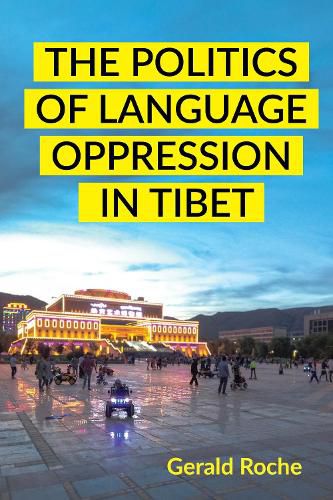Readings Newsletter
Become a Readings Member to make your shopping experience even easier.
Sign in or sign up for free!
You’re not far away from qualifying for FREE standard shipping within Australia
You’ve qualified for FREE standard shipping within Australia
The cart is loading…






In The Politics of Language Oppression in Tibet, Gerald Roche sheds light on a global crisis of linguistic diversity that will see at least half of the world's languages disappear this century.
Roche explores the erosion of linguistic diversity through a study of a community on the northeastern Tibetan Plateau in the People's Republic of China. Manegacha is but one of the sixty minority languages in Tibet and is spoken by about 8,000 people who are otherwise mostly indistinguishable from the Tibetan communities surrounding them. Recently, many in these communities have switched to speaking Tibetan, and Manegacha faces an uncertain future.
The author uses the Manegacha case to show how linguistic diversity across Tibet is collapsing under assimilatory state policies. He looks at how global advocacy networks inadequately acknowledge this issue, highlighting the complex politics of language in an inter-connected world. The Politics of Language Oppression in Tibet broadens our understanding of Tibet and China, the crisis of global linguistic diversity, and the radical changes needed to address this crisis.
$9.00 standard shipping within Australia
FREE standard shipping within Australia for orders over $100.00
Express & International shipping calculated at checkout
In The Politics of Language Oppression in Tibet, Gerald Roche sheds light on a global crisis of linguistic diversity that will see at least half of the world's languages disappear this century.
Roche explores the erosion of linguistic diversity through a study of a community on the northeastern Tibetan Plateau in the People's Republic of China. Manegacha is but one of the sixty minority languages in Tibet and is spoken by about 8,000 people who are otherwise mostly indistinguishable from the Tibetan communities surrounding them. Recently, many in these communities have switched to speaking Tibetan, and Manegacha faces an uncertain future.
The author uses the Manegacha case to show how linguistic diversity across Tibet is collapsing under assimilatory state policies. He looks at how global advocacy networks inadequately acknowledge this issue, highlighting the complex politics of language in an inter-connected world. The Politics of Language Oppression in Tibet broadens our understanding of Tibet and China, the crisis of global linguistic diversity, and the radical changes needed to address this crisis.